Jackfruit Vs Durian Vs Soursop: Tropical Titans Clash!
A thorough comparison between jackfruit, durian, and soursop showcases their unique tastes, textures, and nutritional benefits. Jackfruit, originating from India, is celebrated for its versatility and meat-like texture.
Durian, the Southeast Asian ‘king of fruits’, is infamous for its strong smell but loved for its creamy texture. Soursop, from the American tropics, offers a distinctive flavor that combines sweet with sour.
Each fruit has a distinct origin and use:
Explore the exotic profiles of jackfruit, durian, and soursop, from texture to taste and health benefits.

Key Takeaway
Tropical Fruit Guide: Jackfruit, Durian, Soursop
| Feature | Jackfruit | Durian | Soursop |
|---|---|---|---|
| Origin | South India | Southeast Asia | Caribbean, Central & South America |
| Taste | Sweet, subtle flavor | Rich, creamy, almond-like | Sweet and tart |
| Texture | Meaty, fibrous | Creamy, custard-like | Soft, fibrous |
| Culinary Uses | Vegan meat substitute, desserts | Desserts, eaten raw | Beverages, desserts, medicinal uses |
| Nutritional Benefits | High in fiber, vitamin C | High in calories, vitamin C | Rich in vitamin C, antioxidants |
| Size | Large, up to 35 kg | Large, up to 3 kg | Medium, up to 5 kg |
| Aroma | Mild, fruity | Pungent, strong | Subtle, floral |
| Availability | Year-round | Seasonal (June to August) | Year-round |
Origins and Descriptions
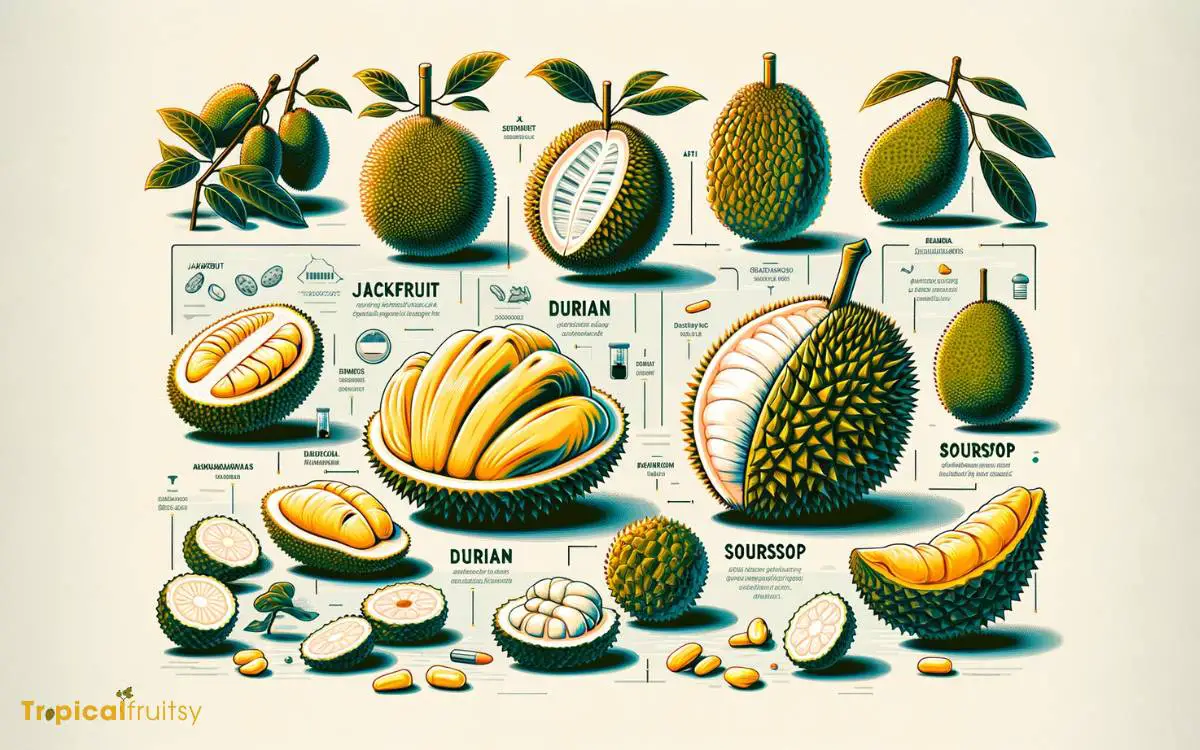
The jackfruit, durian, and soursop are tropical fruits each with a unique origin and distinctive physical characteristics.
Jackfruit, hailing from India, is the largest tree-borne fruit globally and features a spiky, green exterior with fibrous, sweet yellow flesh.
The durian, known as the ‘king of fruits’ in Southeast Asia, is notorious for its pungent odor and formidable thorn-covered rind, encapsulating a rich, custard-like interior.
Originating from the American tropics, soursop bears a prickly green skin with a soft, white, fibrous pulp that has a flavor combination reminiscent of strawberries and apple.
These fruits not only differ in appearance and origin but also offer diverse taste profiles and culinary applications. Their unique attributes warrant a comparative analysis of their nutritional profiles, to which we now turn.
Nutritional Profiles Compared
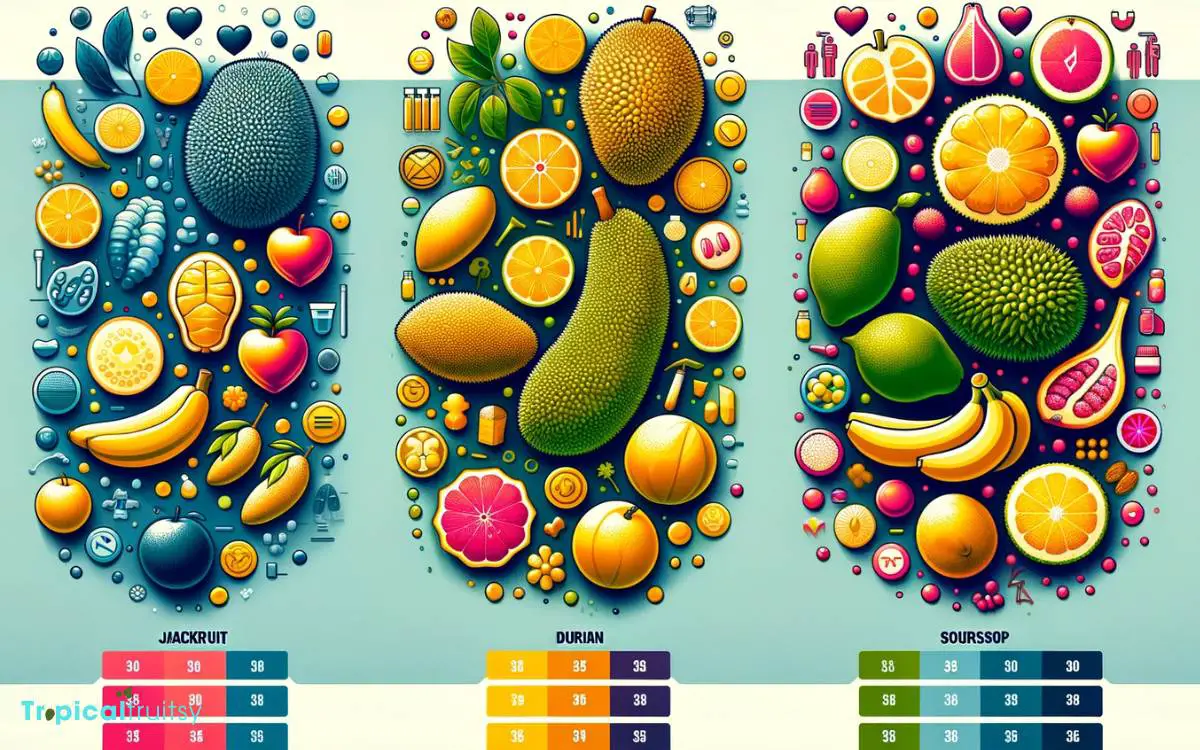
When comparing the nutritional profiles of jackfruit, durian, and soursop, it is essential to examine the variances in their calorie content as a preliminary point of analysis.
A meticulous comparison of the vitamins and minerals each fruit contains will elucidate their respective health benefits and potential dietary contributions.
Furthermore, assessing the fiber content in each fruit will offer insights into their roles in digestive health and satiety.
Calorie Content Differences
Although jackfruit, durian, and soursop are all tropical fruits, they differ significantly in their calorie content and overall nutritional profiles.
Jackfruit, for instance, provides a modest calorie count, with approximately 95 calories per 100 grams, making it a relatively low-energy-dense food. It is rich in dietary fiber and contains several vitamins and minerals, which contributes to a balanced diet.
Durian, on the other hand, is calorie-dense, offering about 147 calories per 100 grams. Its richness in calories is due to its higher fat content, which also imparts a creamy texture to the fruit.
Despite its caloric density, durian is nutritious, supplying a good amount of vitamin C, potassium, and dietary fiber.
Soursop, with a calorie content similar to jackfruit, provides roughly 66 calories per 100 grams. It stands out for its vitamin C and fiber content, while also being lower in carbohydrates compared to the other fruits discussed.
Each fruit’s unique nutritional profile caters to different dietary needs and preferences.
Vitamin and Mineral Comparison
Analyzing the vitamin and mineral content of jackfruit, durian, and soursop reveals distinct nutritional advantages unique to each fruit.
Jackfruit is a significant source of vitamin C, providing a substantial boost to the immune system, and also contains notable levels of vitamin A, which supports vision health.
Durian, often distinguished by its pungent aroma, is rich in thiamin and vitamin B6, essential for energy metabolism and neurotransmitter synthesis, respectively.
Soursop is endowed with a high concentration of antioxidants, including vitamins C and E, and offers a suite of B vitamins.
On the mineral front, jackfruit and soursop provide a good dose of potassium, while durian contains trace minerals such as zinc and magnesium, vital for numerous biochemical functions.
This intricate balance of nutrients sets the stage for an analysis of fiber content, another crucial dietary component.
Fiber Content Analysis
Transitioning from the vitamins and minerals of each fruit, jackfruit’s dietary fiber content stands out as particularly beneficial for digestive health, while durian and soursop also offer notable amounts of fiber with their own unique impacts on the body.
When comparing these fruits, it’s important to analyze the fiber content to understand their respective roles in a balanced diet:
- Jackfruit: Known for its high fiber content, which aids in bowel regulation and can help prevent constipation.
- Durian: Contains a significant amount of dietary fiber, which is essential for maintaining healthy digestion and reducing cholesterol levels.
- Soursop: Offers a good source of fiber that can assist in digestive health and may have anti-inflammatory properties.
- Comparison: All three fruits contribute to the recommended daily intake of fiber, each with distinct health benefits.
Flavor and Texture Analysis
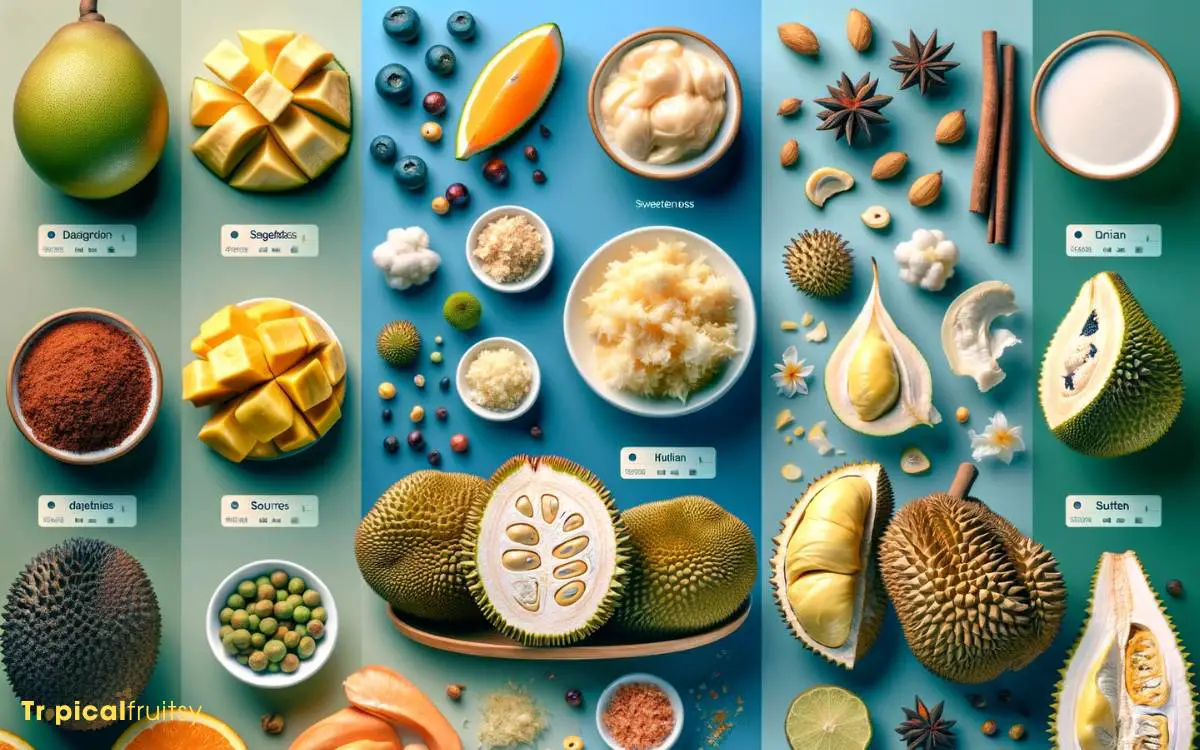
While jackfruit, durian, and soursop are all tropical fruits, they offer distinctly different flavor profiles and textures that are worth exploring in detail.
Jackfruit is known for its sweet, subtly tart flavor with hints of banana, mango, and pineapple. Its texture is reminiscent of a dense, chewy banana when ripe, and it can be used as a meat substitute when unripe due to its firmer texture.
Durian’s flavor is complex, with a creamy richness and notes of almond, which is often overshadowed by its pungent aroma. Its custard-like texture is unique and can be polarizing.
Soursop combines flavors of strawberry and apple with sour citrus notes, resulting in a compelling sweet-tart balance. The texture is fibrous and soft, similar to a cooked pear.
Culinary Uses and Recipes
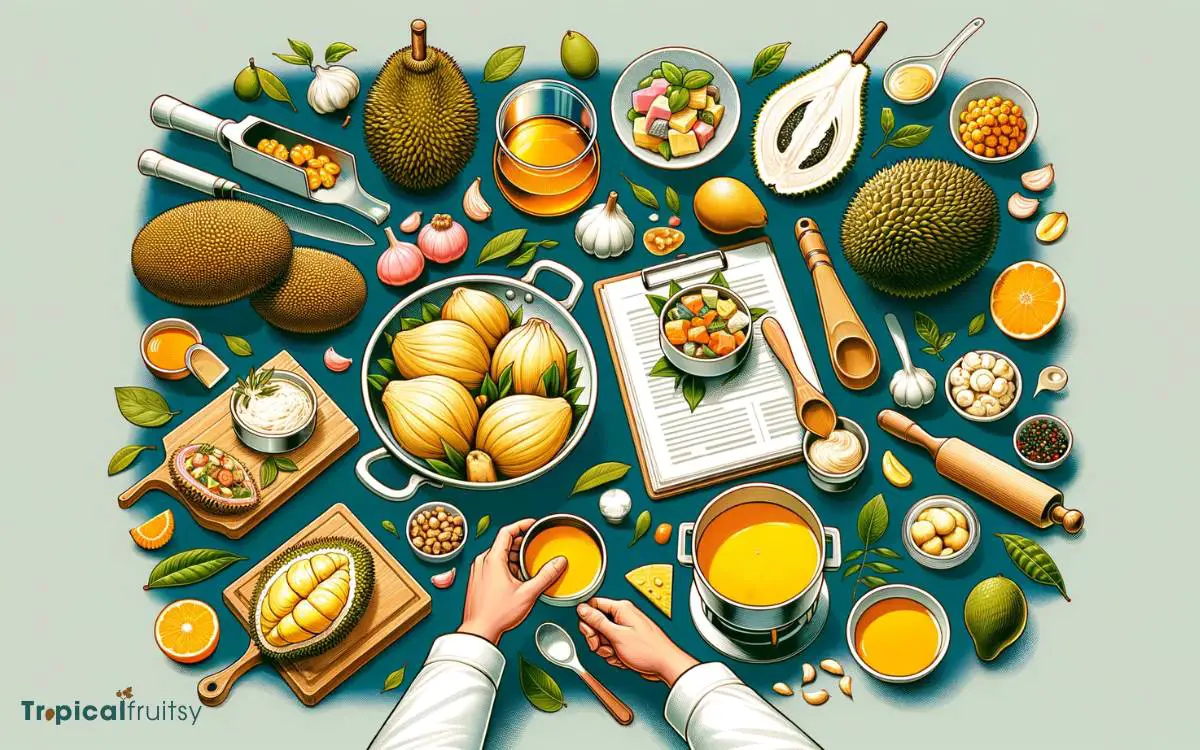
Exploring the culinary applications of jackfruit, durian, and soursop reveals a diverse spectrum of recipes and adaptability in global cuisines.
The robust, meaty texture of jackfruit allows it to serve as a vegetarian substitute in savory dishes. Durian’s intense flavor profile is often harnessed in rich Southeast Asian desserts.
Soursop, with its tangy sweetness, complements both sweet and savory recipes. It offers an array of flavor pairing possibilities ranging from smoothies to sauces.
Recipe Adaptability
Jackfruit, durian, and soursop each offer unique flavors and textures that inspire a diverse range of culinary applications, from savory dishes to sweet desserts.
Analyzing their adaptability in recipes:
- Jackfruit: Its meaty texture makes it an excellent plant-based substitute in savory dishes such as tacos, curries, and pulled ‘pork’ sandwiches. Unripe jackfruit absorbs flavors well, making it versatile in various cuisines.
- Durian: Known for its pungent aroma, durian is primarily used in sweet applications. It’s often found in Southeast Asian desserts like sticky rice, ice cream, and pastries.
- Soursop: With its creamy texture and citrusy flavor, soursop is a popular choice for smoothies, ice creams, and fruit sorbets. It can also be incorporated into sweet and tangy sauces for meats.
Each fruit’s distinct qualities enable a broad spectrum of recipe adaptations, catering to both traditional and innovative culinary ventures.
Flavor Pairing Ideas
Delving into the culinary realm, the nuanced flavors of jackfruit, durian, and soursop can be expertly paired with complementary ingredients to elevate a myriad of dishes.
The table below presents a structured approach to flavor pairings, showcasing how each fruit can be integrated into various recipes:
| Jackfruit | Durian | Soursop |
|---|---|---|
| BBQ Pulled Pork | Sticky Rice | Smoothies |
| Vegan Tacos | Ice Cream | Sorbets |
| Curry | Traditional Kuehs | Cocktails |
| Salads | Pancakes | Dessert Soups |
| Fruit Bowls | Chocolate Pairings | Tea Infusions |
Analyzing each fruit’s profile, jackfruit’s sweet and meaty texture makes it versatile in savory and sweet dishes alike.
Durian’s creamy, custard-like consistency complements rich desserts. Soursop’s tangy flavor excels in refreshing beverages and light desserts, offering a palate-cleansing zest.
Health Benefits and Myths
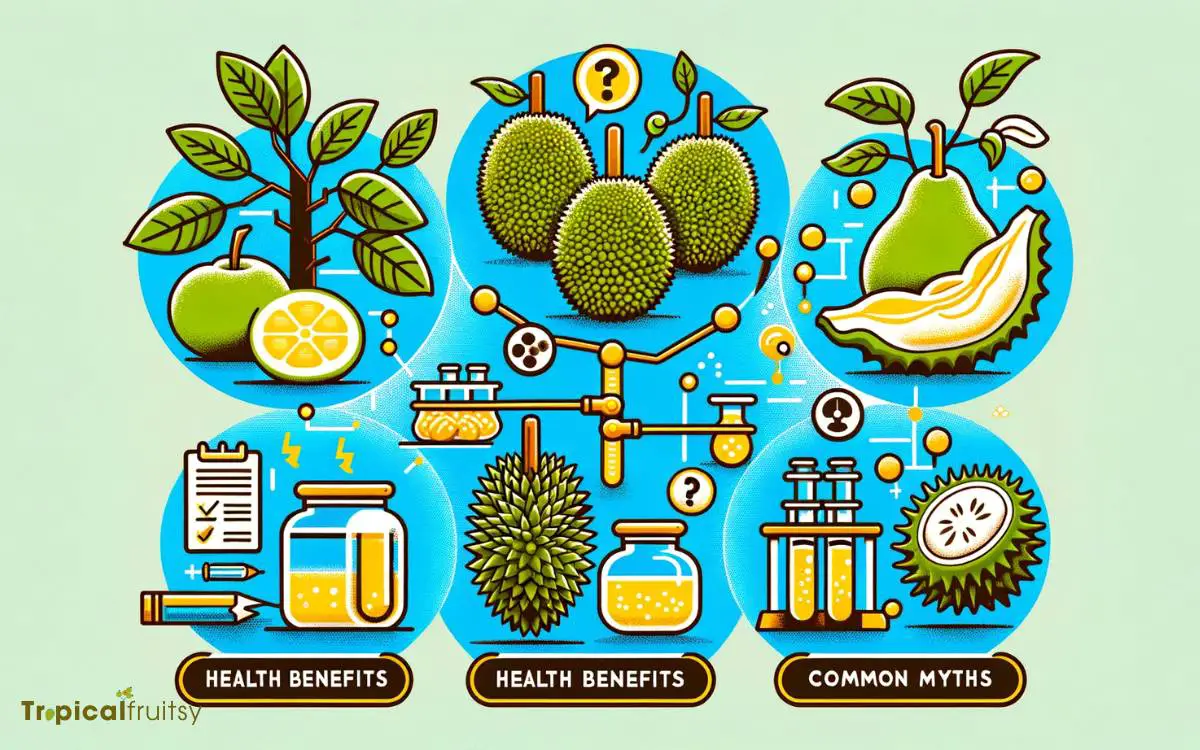
Regarding health benefits and myths, each of these exotic fruits—jackfruit, durian, and soursop—brings a unique profile of nutrients and has been associated with various health claims, some of which are supported by scientific research while others remain anecdotal.
To distill fact from fiction, a methodical examination of their compositions and related health effects is essential:
- Jackfruit: Rich in vitamin C and dietary fiber, it may enhance immune function and digestive health.
- Durian: Contains high levels of thiamin and potassium, potentially benefiting energy metabolism and cardiovascular health.
- Soursop: Often touted for its antioxidant properties, which could counteract oxidative stress and help in preventing chronic diseases.
- Myths: Claims such as curing cancer or causing severe health issues lack rigorous scientific backing and should be approached with skepticism.
Understanding these fruits’ actual health impacts requires navigating between established nutritional science and unverified folklore.
Purchasing and Storage Tips

When it comes to purchasing and storing jackfruit, durian, and soursop, each fruit has its own unique characteristics and requirements.
Here are some tips for each:
Jackfruit:
- Purchasing: Look for jackfruits that are large, firm, and have a strong, sweet aroma. Avoid fruits with bruising or soft spots.
- Storage: Whole jackfruits can be stored at room temperature for a few days if they are not yet ripe. Once ripe, they can be kept in the refrigerator for up to a week. Cut jackfruit should be stored in an airtight container in the refrigerator and consumed within a few days.
Durian:
- Purchasing: Choose durians with an intact husk and stem. The husk should have some spikes that are soft, indicating ripeness. You can also give it a gentle shake; if you can hear the seeds moving inside, it’s likely ripe.
- Storage: Whole durians can be stored at room temperature for a couple of days, but it’s best to consume them as soon as possible after purchase. Once opened, durian should be consumed immediately or stored in an airtight container in the refrigerator for up to two days.
Soursop:
- Purchasing: Select soursops that are firm but yield slightly to pressure, indicating ripeness. The skin should be green and slightly spiky. Avoid fruits with blemishes or signs of overripeness.
- Storage: Unripe soursops can be stored at room temperature to ripen. Once ripe, they can be kept in the refrigerator for a few days. Cut soursop should be stored in an airtight container in the refrigerator and consumed within a couple of days.
General tips for all three fruits:
- Handle them with care to avoid bruising, as they can be delicate.
- Keep them away from direct sunlight and heat.
- When storing cut fruit, wrap it tightly or place it in an airtight container to prevent it from drying out and absorbing odors from other foods in the refrigerator.
By following these tips, you can ensure that your jackfruit, durian, and soursop remain fresh and flavorful for as long as possible.
Conclusion
In the tapestry of tropical fruit, jackfruit, durian, and soursop each embroider a unique pattern of flavor, nutrition, and tradition.
These fruits, often misunderstood and underappreciated in parts of the world, offer a cornucopia of health benefits that echo their exotic origins.
As culinary artists continue to unravel their potential, the allure of these fruits remains an enduring enigma, inviting adventurous palates to a dance of taste and vitality.






